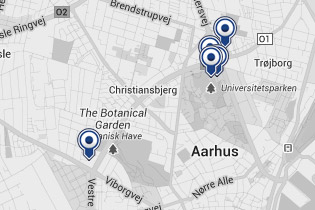FAQ
FAQ
- Frequently Asked Questions
Q1: STUDENTS
Do students have to be enrolled as a degree seaking student in the business school/management-related university faculties? What if they are getting a major in a different college, but getting a minor in the business school? What if they are just taking classes in the business school/management-related university faculties, but majoring and minoring in another college?
There are no formal requirements to the enrollment status of the students. If the institution/university defines the participating students as students at their university and therefore formally guarantee that they really are students, then that is sufficient for the PRME LEADERS+20 Competition.
It is not important whether the students are enrolled at the business school/management-related university faculty or at another college. The interdisciplinary aspect is indeed very interesting to the competition. The team should however be able to explain why their entry is relevant for the creation of "the sustainable leaders of tomorrow".
Q2: LECTURERS
Does the lecturer have to hold an appointment in the business school/management-related university faculties or can he/she simply teach a class there (but have an appointment in another college)?
The formal employee status is not relevant. The lecturer should be able to present arguments as to why his/her entry contributes to the creation of "the sustainable leaders of tomorrow".
Q3: MANAGEMENT-RELATED UNIVERSITY FACULTY
Can you provide some examples of what you mean by "management-related university faculties"?
This could be engineering faculties combining engineering courses with management courses and thus educating future leaders and managers. The interesting part is the perspective and the purpose of the course. If teams define their engineering, biology, science or other programmes as programmes educating future leaders and managers, it fits perfectly with the PRME LEADERS+20 Competition.
Q4: TEAM COMPOSITION
Is it obligatory to have a lecturer in the team, or can we make a team composed just of students?
You have to have a lecturer on your team. Check out the INTRODUCTION VIDEO - find it on the frontpage and on the submission site.
Q5: TEAM BACKGROUND
Is it necessary that all students study at the same university? in the same country?
Interdisciplinarity and diversity in nationalities is a positive. Have in mind that the course your team chooses as a case for your entries should be connected to one specific university/business school.
Q6: TEAM MEMBERS - HOW MANY?
Is it strictly a team based competition, and if so, is there a limit on the number of team members?
It is strictly a team based competition! You may be as many on the team as you like.
However, the two prizes comprise to a fixed amount which the winning teams will have to split (e.g. the 1st prize amounts to 13,000 Euros and from that amount teams will have to finance registration,- travel,- living- and housing expenses going to and staying in Rio).
Additionally, the UN will give passes to maximum five team members, including the lecturer, in connection with the UN forums in Rio (i.e. the 1st prize).
Q7: MAY PHD STUDENTS PARTICIPATE?
Is there any way we can participate in this competition as PhD students?
The 2nd prize (i.e. Scholarships for AU Summer University and MBA Summer School) may not match PhD students as these scholarships are targeted at BA, MA and MBA students.
However, if PhD students accept and comply with these terms, we are happy to accept your submission.
Q8: MAY MBA STUDENTS PARTICIPATE?
Is there any way we can participate in this competition as MBA students?
Yes! We now offer MBA students funding for scholarships for ESSAM MBA Summer School as part of the 2nd prize. Funding is equal to EUR 4,300.
Q9: NEW ASPECTS?
How new do the aspects of sustainability incorporated in the course description have to be?
The main focus of the competition is education for future responsible leaders (i.e. “LEADERS+20”). The new or adapted course description should demonstrate innovative ideas for integrating sustainability aspects in management-related education. The entry should focus on the 6 principles for Responsible Management Education and the themes of the Rio+20 Conference on Sustainable Development. If the participants decide to adapt an existing course, they are advised to present a version of the course description as it appeared before the adaptation took place and thereby demonstrating the “new” aspects of the course. Also, it is importent that the entries are based on student/lecturer discussions and collaboration.
Q10: DEADLINE POSTPONED?
Has the deadline been changed?
The competition deadline has been postponed to 1 April! (Before 19 March)
Q11: SHOULD STUDENTS PARTICIPATE IN THE (RE)DESIGNED COURSE/PROGRAMME?
Should we (as students) participate in the course which we are designing?
As participants of the competition, you do not have to participate in the programme or course you develop or adapt. As long as your team is made up by students - and you have a lecturer who will join your team – you are very welcome to join the competition.
Q12: FACEBOOK "LIKES" SYSTEM?
In terms of gaining 'likes' on Facebook, is it a matter of creating our own group page and inviting people to like it?
If you follow this LINK to the Competition Example Video on the submission site, you will see the Facebook "like" button at the very bottom of the page - below Download PDF:
This will appear at the bottom of all entries uploaded to the the PRME LEADERS+20 Submission Site!
Q13: DEADLINE AND WEIGHTING OF FACEBOOK "LIKES"?
We would like to know if there’s a deadline for people submitting ‘Like’ to the video?
What is the weighting of the facebook ‘Likes’ on videos in evaluating the proposal being submitted for the new course?
Regarding the FB Likes, they are referred to as SECONDARY CRITERIA
- Ability to spread the word of the team’s entries and gain support which is measured by the number of Facebook “Likes”
The team submission to this competition will first and foremost be judged by MAIN CRITERIA
- The entries will first and foremost be assessed by their originality and creativity in order to integrate sustainability approaches, e.g. by interdisciplinary cooperation in courses and curricula at business schools and management-related university faculties.
- Ability to present the teams ideas
- Relevance to the Rio+20 Conference themes: (a) a green economy in the context of sustainable development and poverty eradication; and (b) the institutional framework for sustainable development (www.uncsd2012.org)
- Relevance to the six PRME principles: Purpose, Values, Method, Research, Partnership, and Dialogue (www.unprme.org)
On the main page you see how many comments each entry has received which will appear as a small blue speech bubble counting the comments.
The FB Likes which will be taken into account are those which appear at the bottom of each entry – right below the PDF entry.
All entries will go through a screening process conducted by an Academic Screening Group composed by professional representatives from all around the world. Based on the competition criteria, they will then decide which entries will move on to be judged by the Award Committee cf. ASSESSMENT
1 April – 7 May 2012
- Screening process
- Members of the Award Committee place their individual votes









